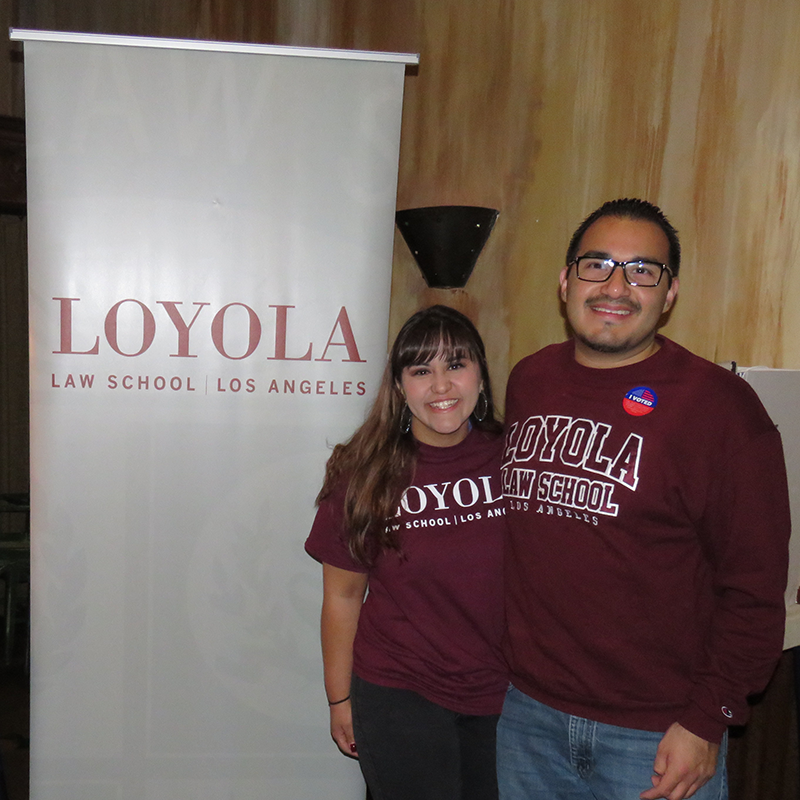As Transfer Students, Married Couple Find Footing at LLS

Just a few years before co-founding their own personal-injury law firm with offices in two California counties, Karla Preciado-Garcia ’20 and Paul Garcia ’20 were busy honing their skills as transfer students at LMU Loyola Law School (LLS). Both were honored for their work in the Youth Justice Education Clinic (YJEC), where they represented children with special needs requiring accommodations in school.
“The Youth Justice Education Clinic really makes a difference in people’s lives from the very beginning,” Garcia said. “It’s an important clinic because you can address students’ issues before they get into serious trouble.”
The clinic primarily represents children with special needs who require accommodations to succeed in school. Loyola students participating in the yearlong clinic help parents advocate with school officials to ensure the schools develop and implement Individual Education Plans for their children. Clinic students also interview and counsel clients to represent them in special education and school disciplinary proceedings.
“We make sure they get the accommodations from their schools,” Preciado-Garcia said.
“I think a lot of school administrators think our clients are lazy and not interested in school,” Garcia added. “Once students are diagnosed, the administrators kind of believe it, but they don’t understand the extent. That’s where the clinic gets involved.”
One reason they were eager to join the clinic was that Preciado-Garcia had wanted to become a teacher and was interested in education law. “Many law schools don’t offer anything comparable to Loyola’s education clinic,” she said.
Another reason is that Garcia knows what it’s like to need educational accommodation himself. During his 1L year at law school in San Francisco, he was diagnosed with dyslexia.
“Finding that out was huge,” Preciado-Garcia said, because her husband’s first semester grades were not very good. “But after he received the accommodations he needed, he ended up getting mostly A’s.”
Seeing the difference accommodations made in his own life also kindled his own interest in education law. “I’ve definitely lived through it. Being an advocate is important,” Garcia said.
Lifelong Southern California natives, Garcia and Preciado-Garcia have done most everything together since meeting in a political science class at UCLA, including working for several years as adjusters for a top auto insurance company. They started law school at the Bay Area school because that was the one that accepted them both — even though it meant leaving their baby daughter behind with Preciado-Garcia’s mother. “We had piece of mind that our daughter was in good hands with my mother-in-law,” added Garcia.
Garcia’s dramatically improved grades allowed them both to transfer to Loyola, allowing them to be near their toddler daughter in Los Angeles. They started in the fall of 2018.
“Loyola’s been great with accommodations,” Garcia says.
In addition to the youth education clinic under director Professor Michael Smith, they took a class on Mental Disabilities Law taught by Professor Jan C. Costello. Additionally, Loyola is home to The Coelho Center on Disability Law, Policy & Innovation, which seeks to increase the pipeline of law students with disabilities.
Garcia was on the staff of the school’s International and Comparative Law Review. The couple handled real cases with the Riverside County Public Defender’s Office in Indio this summer with funding from Loyola’s Summer Public Interest Employment Program (SPIEP).
Outside of class, the couple were involved with the Immigration Law Society and La Raza de Loyola. “We each got a mentor from La Raza,” Preciado-Garcia said.
“La Raza as an organization has been very supportive,” her husband added. “I think it is part of the whole Loyola atmosphere for us. We feel right at home.”
The work we do at Loyola Law School matters. Apply today.